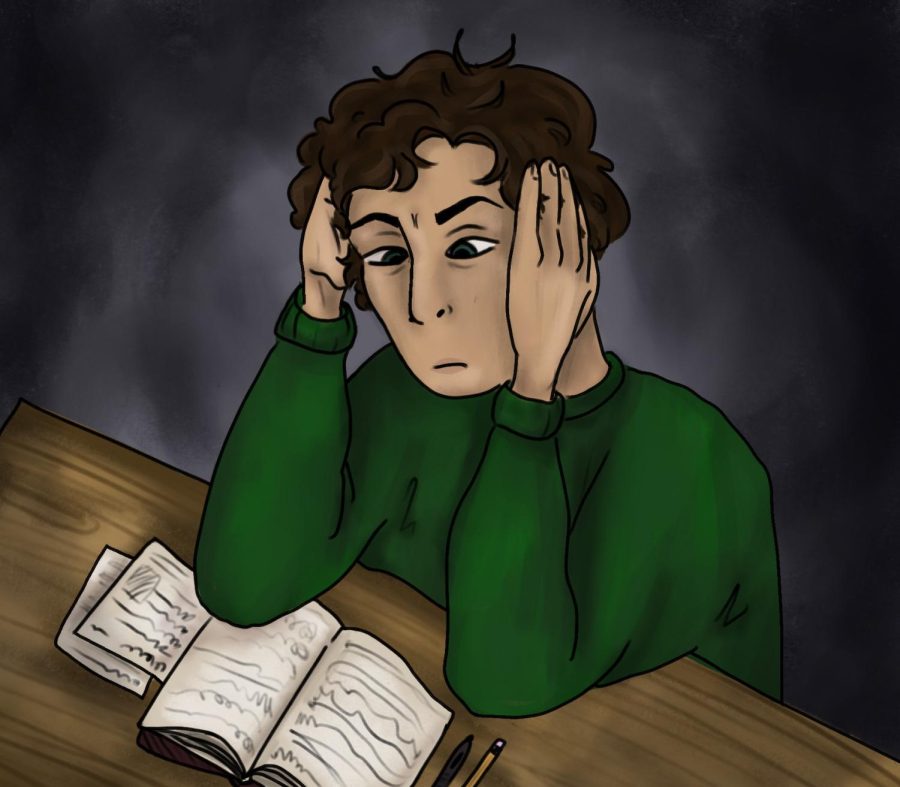Senioritis is real
Students are struggling to stay motivated as graduation nears
In their final quarter of high school, many seniors are struggling to stay focused and motivated academically.
April 25, 2022
For seniors, the countdown to graduation has begun. With our last quarter of high school in full swing, a plague known as senioritis has started spreading across our class. Senioritis is not a disease that attacks your body or blood cells; rather, it attacks your grades and attendance record. Often showing up in the last few months or weeks of senior year, it presents as severe academic apathy and a complete lack of motivation. Late work, skipped classes, failing grades, missed practices or meetings and unread emails in your inbox are all symptoms.
For some, the affliction is less intense and harder to recognize. Maybe you turn in essays but they are unedited. You show up to class but are late or unprepared. You come to school but are wearing sweatpants or pajamas. You do homework but copy the answers off a Quizlet. You come to class but don’t participate in discussion. However it presents, senioritis is a common phenomenon; 69% of seniors in a survey by NYU agreed their academic efforts would decline during the second semester of senior year.
Teachers, staff and parents have all debated whether senioritis is a real issue or a convenient excuse for laziness. From the perspective of a senior, the truth really falls somewhere in the middle. The whirlwind of stress, anticipation and excitement that comes with the end of senior year leads to some unavoidable mental and academic struggle. However, it is also often an allowance for students to drop the ball where they normally wouldn’t. Seniors should take accountability over these last few weeks rather than surrender to the pressure to give up. At the same time, schools and families need to recognize that senioritis is as much an issue of student wellness as it is a question of willpower.
For the class of 2022 in particular, this wave of senioritis is a case of severe burnout that goes beyond the typical senior year exhaustion. When the COVID-19 pandemic hit at the end of our sophomore year, our visions of our transition to being upperclassmen was crushed. With the world changing around us, the expectations to keep up our grades, maintain social lives, get jobs, develop our independence and become leaders in the school remained. We did all of this while navigating rapidly changing public health orders, school systems and college application processes. Over half of our high school careers have been defined by this struggle. Now, we are trying to cope with academic stress, come to terms with the end of our high school years, and confront the looming threat of true adulthood and responsibility. This has all, understandably, left many of us without much to give at this point.
For our class, this is the year we are making up for all of the opportunities and memories missed over the course of the pandemic. We are having our first normal Prom experience. Many of us are experiencing in-person State competitions for the sports and activities we are involved in. We are hanging out with friends and going to parties and concerts again. While trying to make up for all the things we missed socially, a lot of us have lost focus on academics, which has made this year’s senioritis surge more powerful.
Even as we enjoy making up for lost time, many seniors are counting down the days until we start the next chapter in our lives. With most having locked in their post-high school plans, there is not as much motivation to keep up grades or attendance. The mindset of “I’ll graduate no matter what” is starting to take over, and seeing the light at the end of the tunnel is a relief.
However, even with graduation so close, senior year isn’t over yet, and there are a lot of reasons why it’s important to stay afloat academically for the remainder of this school year. For those going to college, your final semester grades do matter, even if you’ve already committed and paid an enrollment deposit at a university. Colleges can, and will, revoke admission offers if there are drastic slips in grades during your senior year. They can also put you on academic probation for your first semester of college, which would be a major, unnecessary stress during a transition which is already overwhelming. Many seniors are also taking AP tests in May or are dual enrolled, which means your senior year grades impact your college GPA. Further, many of the classes taken during senior year teach concepts and skills that are foundational to the classes you’ll take in college; if you slack off now and don’t bother to study the materials, you’ll be left scrambling to catch up later.
Luckily, there are plenty of steps you can take to reduce or cure senioritis. Stay organized; keep a routine and schedule of some sort to stay on top of your responsibilities. Have a support system of friends and family who will hold you accountable for getting your work done and showing up to class. Process your feelings of excitement, grief, stress and anticipation through whatever method works best for you; journaling, working out, talking about it, doing something creative or listening to music can all help to get through the final stretch of the year. Take breaks and give yourself time to rest, but don’t completely give up. Find a way to balance enjoying your last weeks of high school with still participating in classes and activities. Don’t take these last days with your friends, teachers and classmates for granted. Most importantly, be proud of yourself. Wherever you are headed after graduation, you have worked hard to make it this far. Don’t let your work go to waste by slacking off, but take the time to celebrate how far you’ve come.







